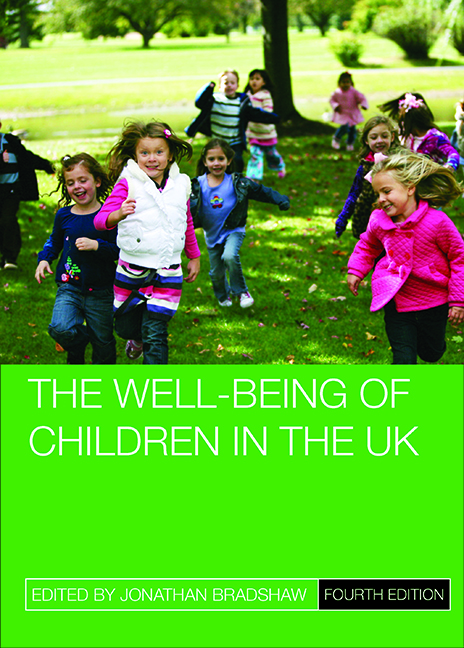Book contents
- Frontmatter
- Contents
- List of figures and tables
- List of abbreviations
- Notes on contributors
- Acknowledgements
- One Introduction
- Two Demography of childhood
- Three Child poverty and deprivation
- Four Physical health
- Five Subjective well-being and mental health
- Six Education
- Seven Housing and the environment for children
- Eight Children’s time and space
- Nine Children and young people in care and leaving care
- Ten Child maltreatment
- Eleven Childcare and early years
- Twelve Children, crime and correction
- Thirteen Conclusion
- Bibliography
- Index
Three - Child poverty and deprivation
Published online by Cambridge University Press: 01 September 2022
- Frontmatter
- Contents
- List of figures and tables
- List of abbreviations
- Notes on contributors
- Acknowledgements
- One Introduction
- Two Demography of childhood
- Three Child poverty and deprivation
- Four Physical health
- Five Subjective well-being and mental health
- Six Education
- Seven Housing and the environment for children
- Eight Children’s time and space
- Nine Children and young people in care and leaving care
- Ten Child maltreatment
- Eleven Childcare and early years
- Twelve Children, crime and correction
- Thirteen Conclusion
- Bibliography
- Index
Summary
Key statistics
• In 2013/14, 17% of children were living in income poverty in the UK.
• Two-thirds of children in poverty live in households with someone in employment.
• Three-quarters of children in poverty live in couple households.
• In 2013, the UK child poverty rate was 17th out of 33 European countries.
• The UK has the second highest proportion in the European Union (EU) of child poverty generated by low work intensity.
• In the countries of the UK, Wales has the highest child poverty rate before and after housing costs. Among the regions, Inner London has by far the highest child poverty rate both before and after housing costs.
• Child poverty is very spatially concentrated.
• Child poverty cost the UK government £29 billion in 2013.
Key trends
• The child poverty rate began to fall after 1998/99 until 2004/05.
• The UK had the largest reduction in child poverty between the mid- 1990s and 2010.
• There has been no reduction in the Child Poverty Act measures since 2010.
• The child poverty rate anchored at 2010/11 prices has risen since 2010 both before and after housing costs.
• The low income and material deprivation rate is also up since 2011.
Key sources
• Households Below Average Income (HBAI)
• European Union Statistics on Income and Living Conditions (EU-SILC)
• Poverty and Social Exclusion (PSE) Survey
• Luxembourg Income Study (LIS)
Introduction
This book is about all children, not just poor children. However, the well-being of children is affected if they are poor, and, as we shall see, most domains of child well-being are affected by poverty or its proxies.
A vast literature on the impact of poverty on outcomes has been reviewed by Griggs and Walker (2008), and their review covered:
• Health. The impact of poverty on health during the antenatal period, birth and infancy is profound. This is the period of foetal development which has great significance for later health, cognitive development, educational attainment and thus, employment and earnings potential. There is evidence that poverty is associated with lower rates of breastfeeding, earlier births, low birth weight, higher rates of mortality and morbidity and maternal depression.
- Type
- Chapter
- Information
- The well-being of children in the UK (4th edition) , pp. 31 - 70Publisher: Bristol University PressPrint publication year: 2011



